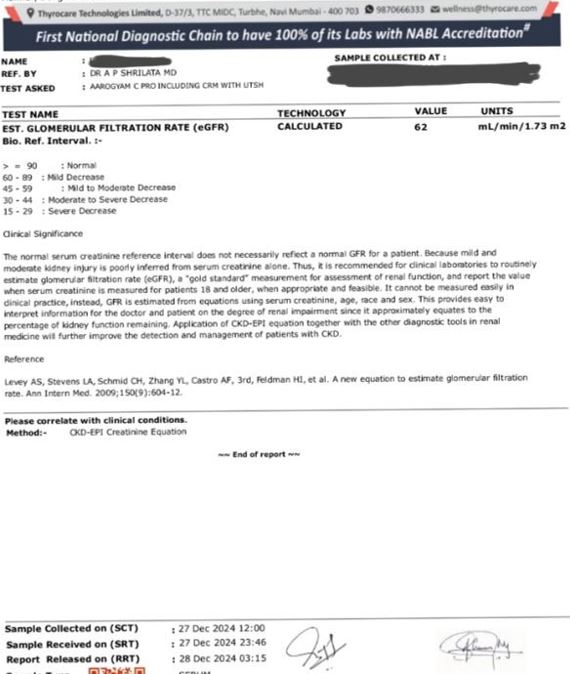Ayurvedic Management of Chronic Kidney Disease (CKD) - A Single Case Study
DOI:
https://doi.org/10.21760/jaims.10.6.59Keywords:
Chronic Kidney Disease (CKD), Glomerular Filtration Rate (GFR), Hemoglobin, Ayurvedic Formulations, Lifestyle ManagementAbstract
Background: Chronic Kidney Disease (CKD) is a progressive condition characterized by the gradual loss of kidney function. The kidneys play a vital role in eliminating waste, regulating fluids, electrolytes, and blood pressure, and producing red blood cells. Globally, CKD affects more than 10% of the population and often leads to end-stage renal failure requiring dialysis or transplantation both of which are expensive and not always successful.
Case Presentation: A 73-year-old male presented with complaints of frequent and frothy urination, fatigue, swelling, disturbed sleep, and a history of uncontrolled hypertension. Laboratory tests revealed elevated serum creatinine and a reduced estimated glomerular filtration rate (eGFR), indicating stage 3b CKD.
Intervention: The patient was managed at Jeevalaya Ayurveda Retreat LLP, Bengaluru, using Ayurvedic formulations including Guluchyadi Kashaya, Punarnavadi Mandoora, Neeri KFT syrup, and supportive in-house preparations. Treatment was complemented with a CKD-specific diet and lifestyle regimen. Clinical progress was tracked using serum creatinine, eGFR, hemoglobin, and blood glucose levels.
Outcome: Over five months, significant improvements were recorded, including reduced serum creatinine, improved eGFR, and better overall well-being. Thus, it can be concluded that Ayurvedic approaches are helpful to manage CKD.
Downloads
References
Colledge NR, Walker BR, Ralston SH, editors. Davidson’s Principles and Practice of Medicine. 21st ed. Amsterdam: Elsevier; 2010. p. 487.
Kirpalani AL, Shah H. Chronic kidney disease. In: Munjal YP, editor. API Textbook of Medicine. 12th ed. New Delhi: Jaypee Brothers Medical Publishers; 2022. p. 2019–29.
Kumar M, Rohila SC, Sharma RK. A conceptual study of Vrikka and Vrikkaroga with special reference to chronic kidney disease: a review. Int J Recent Adv Sci Eng Technol. 2023;10:556–8.
Patel MV, Gupta SN, Patel NG. Effects of Ayurvedic treatment on 100 patients of chronic renal failure (other than diabetic nephropathy). Ayu. 2011;32(4):483–7.
Joladarashi D, Chilkunda ND, Salimath PV. Tinospora cordifolia consumption ameliorates changes in kidney chondroitin sulphate/dermatan sulphate in diabetic rats. J Nutr Sci. 2012;1:e9. PMID: 25191554; PMCID: PMC4153103.
Govind Das Sen. Bhaishajya Ratnavali. Mishra S, editor. Varanasi: Chaukhamba Surabharati Prakashana; Chapter 12, Verses 63–65. p. 381.
Gautam G, Parveen B, Khan MU, Sharma I, Sharma AK, Parveen R, et al. A systematic review on nephron protective AYUSH drugs as constituents of NEERI-KFT (a traditional Indian polyherbal formulation) for the management of chronic kidney disease. Saudi J Biol Sci. 2021;28(11):6441–53.
Lucas DS. Dravyagun Vijnana. Varanasi: Chaukhambha Visvabharati; p. 230–3.
Lucas DS. Dravyagun Vijnana. Varanasi: Chaukhambha Visvabharati; p. 263–7.
Phimarn W, Sungthong B, Itabe H. Effect of Triphala on lipid and glucose profiles and anthropometric parameters: a systematic review. J Evid Based Integr Med. 2021;26:1–9.















